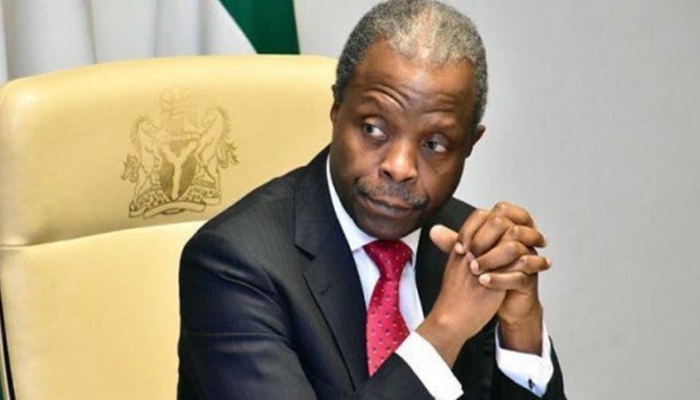Osinbajo advises African leaders on the need to provide youths jobs, other opportunities

*At launch of UN Global Compact Africa Strategy, VP urges private sector to scale up contribution to continent’s economic growth
*UN to open new Global Compact Africa office in Abuja, 2022
In furtherance of the Sustainable Development Goals (SDGs), seeking to promote economic growth, social inclusion, and environmental protection, governments in Africa must ensure that engaging the continent’s rapidly growing youth population through jobs and other opportunities remains its central priority, according to Vice President Yemi Osinbajo, SAN.
Prof. Osinbajo stated this on Monday at the virtual launch of the United Nations Global Compact Africa Strategy – an initiative of the United Nations to galvanize private sector participation in the actualization of the SDGs.
He added that Africa’s private sector must also scale up its contribution to the continent’s economic and social transformation.
The UN Global Compact Strategy is regarded as the world’s largest corporate sustainability initiative, and its new Africa Strategy is designed to promote corporate sustainability and expand responsible business practices across the continent in support of the Sustainable Development Goals (SDGs).
According to the UN, with 1.3 billion people and a combined GDP of $3.5 trillion, Africa is the world’s fastest-growing market and its companies are well-positioned to play a critical role in the business sustainability movement.
“The Decade of Action for the SDGs is a historic opportunity to realize our vision for a more resilient, inclusive, and prosperous Africa,” noted the Vice President yesterday.
Prof. Osinbajo said, “making our aspirations a reality, however, will require an unprecedented degree of cooperation and collective action across all actors of society – Governments, civil society, and of course, the private sector.
“Now is the time for the African private sector to scale up its contribution to the continent’s economic and social transformation. As the African Continental Free Trade Agreement enters into force, African businesses have a historic opportunity to embrace sustainability and be part of the collective effort to build a more sustainable and inclusive future.
“At the same time, sustainable business models and investments, guided by the SDGs, will unlock an estimated US$1 trillion for responsible businesses in Africa by 2030.”
Welcoming the establishment of the new UN Global Compact Africa Hub in Abuja next year to coordinate and drive the implementation of the Strategy on the continent, the VP expressed his “full support for the new Africa Strategy, particularly for its focus on SMEs, youth and women, to ensure that no one is left behind on our journey towards achieving sustainable and inclusive development.”
He further stated that “the new UN Global Compact Africa Strategy comes at a crucial time. With its global multi-stakeholder network and its unparalleled thought leadership and expertise, the United Nations Global Compact is uniquely positioned to play a vital role in mobilizing the African private sector for the SDGs.
“And as we tackle the issues of climate change and embark on collectively transitioning to a net-zero global economy, it is important to underscore the principle of common, but differentiated responsibilities.”
Prof. Osinbajo urged “all companies operating in Africa to seize this moment and drive ambitious SDGs actions throughout their operations and supply chains, guided by the Ten Principles of the UN Global Compact on human rights, labour, environment, and anti-corruption.”
He then called “on all companies across Africa to engage more deeply as a strong and positive influence on society, and leverage their resources, innovation, and investments to advance the Global Goals and create the Africa we want. I look forward to continuing to work closely together with the UN Global Compact in implementing this ambitious strategy.”
As the VP noted, “only by working together – across Governments, the private sector, and civil society – can we pave the way for a stronger, more equitable, and more inclusive world.”
Other speakers at the launch included United Nations Under-Secretary-General for Africa, Cristina Duarte; the CEO and Executive Director of the UN Global Compact, Sanda Ojiambo, among others.






